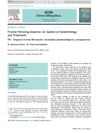Search
forProducts matching "dutas"
Tracking 1 products like 156 Dutas Capsules 0.5mg from by companies like Inhouse Pharmacy. View product »
Sort by
Research
180-210 / 1000+ resultsresearch PSA Concentration Change in Men Taking Low Dose Finasteride and Dutasteride for Male Androgenetic Alopecia
research Efficacy, Safety and Tolerability of Dutasteride in Male Patients with Male Pattern Hair Loss
research Faculty Opinions Recommendation of a Randomized, Active- and Placebo-Controlled Study of the Efficacy and Safety of Different Doses of Dutasteride Versus Placebo and Finasteride in the Treatment of Male Subjects with Androgenetic Alopecia

research Frontal Fibrosing Alopecia: A Multicenter Review of 355 Patients
Most patients with frontal fibrosing alopecia are postmenopausal women, and treatments like finasteride and dutasteride can improve or stabilize the condition.

research Adverse Side Effects of 5α-Reductase Inhibitors Therapy: Persistent Diminished Libido, Erectile Dysfunction, and Depression in a Subset of Patients
Some patients taking finasteride or dutasteride may have ongoing sexual problems and depression even after stopping the medication.

research Evidence-Based Guideline for the Treatment of Androgenetic Alopecia in Women and Men
Use minoxidil for hair loss; finasteride and dutasteride for men, dutasteride for women.

research Androgenetic Alopecia: An Update Of Treatment Options
Minoxidil is the only FDA-approved topical drug for treating male or female pattern hair loss, and other medications like finasteride and dutasteride can also increase hair growth.

research 5α-Reductase Inhibition Prevents the Luteal Phase Increase in Plasma Allopregnanolone Levels and Mitigates Symptoms in Women with Premenstrual Dysphoric Disorder
High-dose dutasteride reduces PMDD symptoms by stabilizing neurosteroid levels.

research Frontal Fibrosing Alopecia: A Retrospective Review of 19 Patients Seen at Duke University
Dutasteride may help stabilize Frontal Fibrosing Alopecia, but more research is needed.

research Anti-Androgens May Protect Against Severe COVID-19 Outcomes: Results From a Prospective Cohort Study of 77 Hospitalized Men
Anti-androgens, like finasteride, dutasteride, and spironolactone, may lessen the severity of COVID-19 in men, leading to fewer ICU admissions.
research 5 Alpha-Reductase Inhibitors: What's New?
A new drug, dutasteride, is at least as effective as the older drug, finasteride, for treating enlarged prostate and may have additional uses.

research Clinical Application of 5α-Reductase Inhibitors
5α-reductase inhibitors, like finasteride and dutasteride, effectively treat BPH, male baldness, and hirsutism, with potential for acne and prostate cancer prevention.

research Guidelines for the Diagnosis and Treatment of Male-Pattern and Female-Pattern Hair Loss, 2017 Version
Use finasteride, dutasteride, and minoxidil for hair loss treatment.

research 5α-Reductase Inhibitors in Androgenetic Alopecia
Finasteride and dutasteride effectively treat hair loss in men and women, but may cause side effects like low libido and depression.

research Incidence of Type 2 Diabetes Mellitus in Men Receiving Steroid 5α-Reductase Inhibitors: Population-Based Cohort Study
Men taking dutasteride or finasteride have a slightly higher risk of developing type 2 diabetes.

research 5alpha-Reductase Inhibitors Dampen L-DOPA-Induced Dyskinesia via Normalization of Dopamine D1-Receptor Signaling Pathway and D1-D3 Receptor Interaction
Finasteride and dutasteride reduce unwanted movements from Parkinson's disease treatment by normalizing certain brain signals.

research 5-Alpha Reductase Inhibitors in Androgenetic Alopecia: Shifting Paradigms, Current Concepts, Comparative Efficacy, and Safety
Dutasteride works better than finasteride for hair loss, with both being safe to use.
research Hormonal Manipulation of Benign Prostatic Hyperplasia
Finasteride and dutasteride are equally effective and safe for treating benign prostatic hyperplasia.

research 5-Alpha-Reductase Inhibitors and Combination Therapy
Finasteride and dutasteride are effective for long-term treatment of enlarged prostates but have sexual side effects and a risk of high-grade prostate cancer.

research A Connection Between the Mitochondrial Permeability Transition Pore, Autophagy, and Cerebral Amyloidogenesis
Dutasteride may help reduce brain plaque linked to Alzheimer's by affecting cell energy structures and waste removal.

research Relative Efficacy of Minoxidil and the 5-Alpha Reductase Inhibitors in Androgenetic Alopecia Treatment of Male Patients
Dutasteride is the most effective hair loss treatment after 24 weeks, but finasteride leads to the most hair growth after 48 weeks.
research Atypical Post-Finasteride Syndrome: A Pharmacological Riddle
Finasteride and dutasteride can cause severe, lasting side effects.

research Hair Characteristics and Androgenetic Alopecia in Koreans
Korean hair is typically thicker with a slower growth rate, and treatments like Dutasteride are effective for male pattern hair loss without major side effects.

research Frontal Fibrosing Alopecia: An Update on Epidemiology and Treatment
New treatments for Frontal Fibrosing Alopecia show promise, especially finasteride and dutasteride, with most patients seeing improvement or stabilization.

research 5α-Reductase Inhibitors Increase Acute Coronary Syndrome Risk in Patients with Benign Prostate Hyperplasia
Taking both finasteride and dutasteride for prostate issues may raise the risk of heart problems.

research Side Effects Related to 5 Alpha-Reductase Inhibitor Treatment of Hair Loss in Women: A Review
The review found that women using hair loss drugs like finasteride and dutasteride rarely reported sexual side effects.
research Hyperpigmentation Following Treatment of Frontal Fibrosing Alopecia
A woman's skin darkened after using dutasteride and pimecrolimus for hair loss, but improved when she stopped the medications and protected her skin from light.

research The Connection of 5-Alpha Reductase Inhibitors to the Development of Depression
5-alpha reductase inhibitors, like finasteride and dutasteride, may cause depression, but more research is needed to understand why.
research The Latest Trends of Treatment for Alopecia
Finasteride, Dutasteride, and Minoxidil are effective for hair growth, while new treatments like laser therapy and PRP show promise with few side effects.